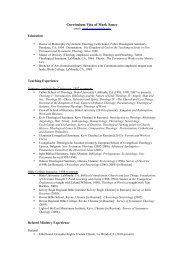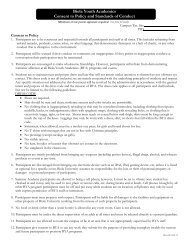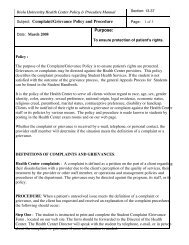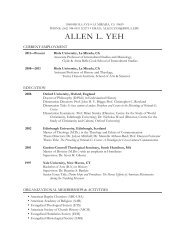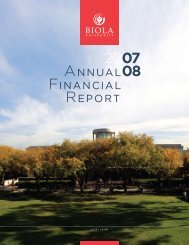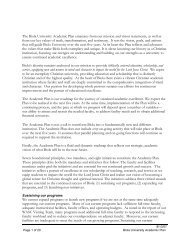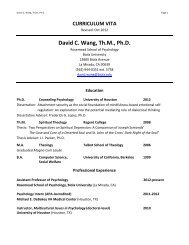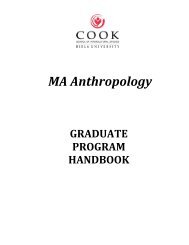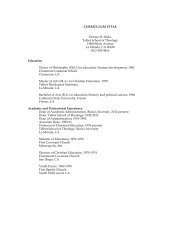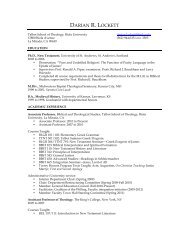You also want an ePaper? Increase the reach of your titles
YUMPU automatically turns print PDFs into web optimized ePapers that Google loves.
Rosemead School of Psychology<br />
Faculty<br />
Dean: ................................................................................. Patricia L. Pike, Ph.D.<br />
Professors:.........Duvall, Edwards, Grace, Hill, Ingram, McQueen,<br />
......................................................... Narramore, Poelstra, Strauss, Worden<br />
Associate Professors: ................. Anderson, Cimbora, Coe, E. Hall,<br />
.......................................................... T. Hall, Jones, Kelley, Pike, Steinmeier<br />
Assistant Professors: ........................................................Porter, Williams<br />
Objectives<br />
The Rosemead School of Psychology of <strong>Biola</strong> <strong>University</strong>, in addition<br />
to its undergraduate work, offers graduate work leading toward the<br />
Doctor of Psychology (Psy.D.), and the Doctor of Philosophy (Ph.<br />
D.) degrees in clinical psychology. Rosemead’s doctoral programs<br />
are accredited by the Committee on Accreditation of the American<br />
Psychological Association, 750 First Street NE, Washington DC 20002-<br />
4242, (202) 336-5979.<br />
Training Models in Clinical Psychology<br />
In the past 40 years there has been discussion and debate by psychologists<br />
over appropriate training models and degrees in clinical<br />
psychology. During the 1950s and 1960s, most doctoral training in<br />
psychology followed the scientist professional model and culminated<br />
in the awarding of the Ph.D. These programs were designed to<br />
train scientifically oriented researchers and professionals.<br />
During the 1960s and 1970s the need for training programs with<br />
stronger professional orientations became apparent. Institutions like<br />
the <strong>University</strong> of Illinois, the California School of Professional Psychology,<br />
the <strong>University</strong> of Denver, Baylor <strong>University</strong>, Rutgers <strong>University</strong><br />
and the Rosemead Graduate School of Psychology were among the<br />
first to offer programs designed explicitly to provide doctoral training<br />
following either a professional (practitioner) or a professional-scientist<br />
(practitioner-scientist) model of training.<br />
Without rejecting the need for training in the basic science areas of<br />
psychology, these programs began placing proportionately greater<br />
emphasis on the professional aspects of training. After three decades<br />
of discussion, debate and innovation, graduate training programs<br />
in clinical psychology now cover a broad range of emphases from<br />
highly professional to highly scientific.<br />
Rosemead’s doctoral programs continue in the professional orientation<br />
tradition with the PhD following a practitioner-scientist model,<br />
and the Psy.D. following a practitioner model.<br />
Degrees Offered<br />
m a s t e r o f a r t s<br />
A master’s degree is awarded as a student progresses in the doctoral<br />
program. Special application for a terminal master’s degree must be<br />
approved on an individual basis.<br />
d o C t o r o f P s yC h o l o G y<br />
& d o C t o r o f P h I l o s o P h y<br />
Rosemead’s doctoral programs in clinical psychology are designed<br />
primarily to train practitioners in professional psychology. They are<br />
designed for students interested in pursuing careers in applied areas<br />
of clinical psychology. While all students receive training in the basic<br />
areas of scientific psychology relevant to the practice of psychology,<br />
the focus of Rosemead’s doctoral training is on the development of<br />
professional skills and the utilization of theory and research in professional<br />
practice. Within this focus students may select either the Psy.D.<br />
or the Ph.D. program. Approximately 67% of Rosemead’s students are<br />
enrolled in the Psy.D. and 33% in the Ph.D. Except in unusual circumstances,<br />
students do not change programs after admission.<br />
While both the Psy.D. and Ph.D. have a common core of basic science<br />
and clinical courses, students selecting Rosemead’s Psy.D. are generally<br />
preparing for full-time positions as psychological practitioners.<br />
Those choosing Rosemead’s Ph.D. are interested in combining clinical<br />
work with other psychological competencies, such as teaching<br />
and research. Research training in Rosemead’s Ph.D. program is<br />
strong in selected areas of ongoing faculty research. Thus the Ph.D.<br />
is particularly appropriate for students who desire both to develop<br />
quality clinical skills and to develop research skills related to clinical<br />
practice.<br />
Additional Educational Opportunities<br />
t r a I n I n G & r e s e a r C h faC I l I t I e s<br />
Rosemead maintains an outpatient psychological service and<br />
training center on the <strong>Biola</strong> campus. The clinic offers a wide range<br />
of psychological services to adults and children. It also provides oncampus<br />
training opportunities for students. The clinic is equipped<br />
with video-taping facilities for case observation.<br />
Students also receive supervised clinical experiences in a variety of<br />
practicum placements in the Greater Los Angeles Area. These agencies<br />
present students with opportunities to work with clinical professionals<br />
in a variety of therapeutic orientations serving a broad range<br />
of diverse populations. The agencies that regularly train Rosemead<br />
students — surrounding school districts; community mental health<br />
centers; child, adolescent and adult treatment centers; outpatient<br />
clinics; and private and public psychiatric hospitals — ensure that<br />
Rosemead students will gain a breadth of clinical experience in<br />
professional settings working with diverse populations. Students<br />
receive supervision both at their training sites and on campus with<br />
Rosemead faculty. The on-campus supervision ensures an integration<br />
of classroom training and field experience. Recent and current<br />
practicum agencies are listed later in this catalog.<br />
<strong>Biola</strong> has a commitment to academic computing which provides<br />
substantial computing resources for Rosemead students and faculty.<br />
<strong>Biola</strong> has two computers and a computer processing laboratory<br />
which are the core of a Campus Information System. Our student<br />
labs are equipped with numerous Pentium and Apple PowerPC<br />
workstations. We also have a Computer Science Alcove equipped<br />
264 Rosemead School of Psychology B I O L A U N I V E R S I T Y



